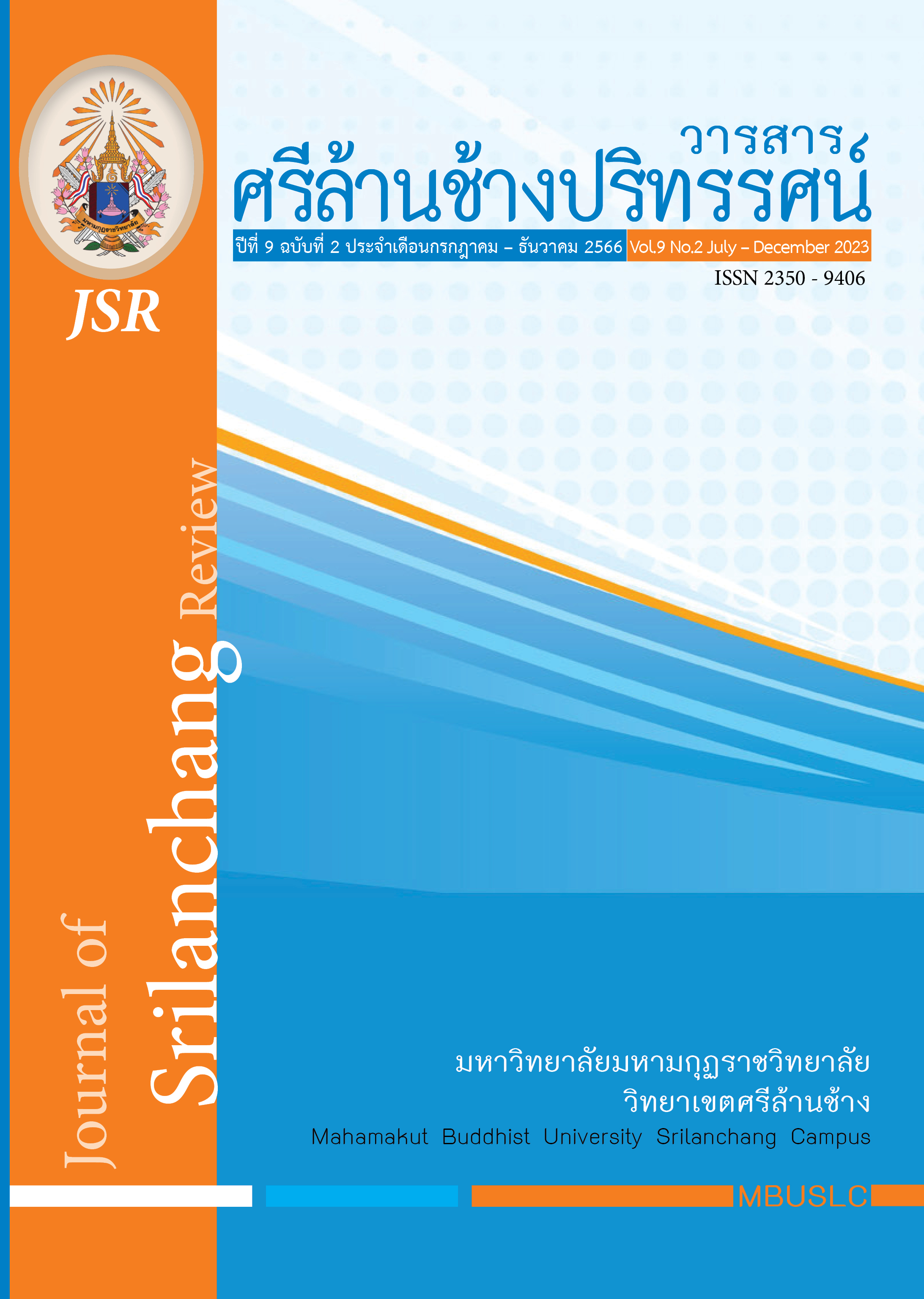MORALITY INDOCTRINATION OF RAHULOVADA-SUTTA-BASED INTEGRITY FOR PRIMARY SCHOOL STUDENTS UNDER LOEI MUNICIPALITY
Main Article Content
Abstract
The objectives of the research were (1) to study the level of integrity of primary school students under Loei Municipality, (2) to indoctrinate the integrity, based on the Buddha’s teachings in Rahulovada-sutta, to primary school students under Loei Municipality, (3) to assess the Rahulovada-sutta-based indoctrination of integrity to the primary students, and (4) to survey the student satisfaction with the Rahulovada-sutta-based indoctrination of integrity. The research population was a total of two-thousand students in four primary schools under Loei Municipality, 334 research samples were selected through Taro Yamane’s sampling size calculation formula, including the stratified random sampling and the simple random sampling. The research tools used for data collection consisted of fifteen four-choice questions on integrity, the five-level rating scale questionnaire on the student attitude, and the five-level rating scale questionnaire on the student satisfaction. The focus group discussion was used to draft and develop the RAHULA model. The statistics used for data analysis comprised the frequency distribution, percentage, mean and standard deviation. The research findings were as follows: 1. According to knowledge and understanding of the primary school students under Loei Municipality, the morality of integrity was found to be totally at a moderate level, considered from their scores of 50% on integrity, and their attitude on integrity at the highest level, including their negative attitude on integrity at the highest level. 2. The RAHULA Model, composing Reading, Attempt, Honesty, Understanding, Love to learn, and Aspiration, was drafted and developed to indoctrinate the morality of integrity to primary students under Loei Municipality. 3. After the moral indoctrination, the assessment of the students’ understanding of integrity was found to be higher, considered from their scores of about 70%, and their attitude was clearly found. Their positive attitude demonstrated mean scores at the high-highest levels; their negative attitude revealed the moderate-lowest levels of mean scores. 4. The student satisfaction with the Rahulovada-sutta-based indoctrination of integrity was found to be totally at the highest level (x̅ = 4.84, S.D. = 0.367). Separately considered in the descending order, they were the time (x̅ = 4.86, S.D. = 0.348), the location (x̅ = 4.86, S.D. = 0.351), the lecturer (x̅ = 4.83, S.D. = 0.378) and the content (x̅ = 4.82, S.D. = 0.384), respectively.
Article Details

This work is licensed under a Creative Commons Attribution-NonCommercial-NoDerivatives 4.0 International License.
บทความที่ได้รับการพิจารณาจากคณะกรรมการผู้ทรงคุณวุฒิและเผยแผ่ในวารสารฉบับนี้ เป็นทัศนคติและข้อคิดเห็นส่วนบุคคลของผู้เขียนแต่ละท่าน ไม่ถือว่าเป็นทัศนะคติและความรับผิดชอบ
ของบรรณาธิการ
บทความ ข้อมูล เนื้อหา รูปภาพ ฯลฯ ที่ได้รับการตีพิมพ์ในวารสารศรีล้านช้างปริทรรศน์ ถือเป็นลิขสิทธิ์ของวารสารศรีล้านช้างปริทรรศน์ หากบุคคลหรือหน่วยงานใดต้องการนำทั้งหมดหรือส่วนหนึ่งส่วนใดไปเผยแพร่ต่อหรือเพื่อกระทำการใด ๆ จะต้องได้รับอนุญาตเป็นลายลักอักษรจากวารสารศรีล้านช้างปริทรรศน์ ก่อนเท่านั้น
References
กองทุนบำเน็จบำนาญข้าราชการ. (2550). “พระบรมราโชวาทในพระบาทสมเด็จพระปรมินทรมหาภูมิพลอดุลยเดช (รัชกาลที่ 9) ในพิธีพระราชทานปริญญาบัตรแก่ผู้สําเร็จการศึกษาจากมหาวิทยาลัยศรีนครินทรวิโรฒ ณ สวนอัมพร วันที่ 22 มิถุนายน พุทธศักราช 2522” ใน ประมวลพระบรมราโชวาทและพระราชดำรัสของพระบาทสมเด็จพระเจ้าอยู่หัว พุทธศักราช 2520 – 2523. กรุงเทพฯ: กองทุนบำเน็จบำนาญข้าราชการ
ทองพูล ภูสิม และคณะ. (2554). การพัฒนาคุณธรรมจริยธรรมและคุณลักษณะอันพึงประสงค์ 8 ประการ ตามหลักสูตรแกนกลางการศึกษาขั้นพื้นฐาน พ.ศ. 2551 กรณีศึกษาโรงเรียนแกดำวิทยาคาร สำนักงานเขตพื้นที่การศึกษามหาสารคาม เขต 1. วารสารมหาวิทยาลัยราชภัฏมหาสารคาม, 5(1), 175-186.
พระวัชระ สํวโร (กสิวัฒน์). (2558). การพัฒนาคุณธรรม และจริยธรรมนักเรียนโรงเรียนวัดรังสิต สังกัดสำนักงานเขตพื้นที่การศึกษาประถมศึกษาปทุมธานีเขต 1 จังหวัดปทุมธานี. วิทยานิพนธ์ พธ.ม. (การบริหารการศึกษา). พระนครศรีอยุธยา: บัณฑิตวิทยาลัย มหาวิทยาลัยมหาจุฬาลงกรณราชวิทยาลัย.
พัชรี ปิยภัณฑ์. (2562). การพัฒนารูปแบบการจัดกิจกรรมเพื่อเสริมสร้างคุณธรรมจริยธรรม สำหรับนักเรียนชั้นประถมศึกษาปีที่ 6. รายงานการวิจัย. กรุงเทพฯ: มหาวิทยาลัยราชภัฏธนบุรี
โรงเรียนชุมชนศรีสะอาด (เทศบาล 1). (2565). ออนไลน์. สืบค้นเมื่อ 2 พฤษภาคม 2565 แหล่งสืบค้น http://www.st1.ac.th/ข้อมูลพื้นฐาน
บุญชม ศรีสะอาด. (2545). การวิจัยเบื้องต้น. (พิมพ์ครั้งที่ 7). กรุงเทพฯ: สุวีริยาสาส์น.
สำนักราชเลขาธิการ. (2541). “พระบรมราโชวาทในพระบาทสมเด็จพระปรมินทรมหาภูมิพลอดุลยเดช (รัชกาลที่ 9) ในพิธีพระราชทานปริญญาบัตรของมหาวิทยาลัยเชียงใหม่ วันที่ 24 มกราคม พุทธศักราช 2540” ใน ประมวลพระราชดำรัสและพระบรมราโชวาทที่พระราชทานในโอกาสต่าง ๆ ปี พุทธศักราช 2540. กรุงเทพฯ: สำนักราชเลขาธิการ
Jean Piaget. (1997). The Moral Judgement of the Child. London: Routledge & Kegan Paul Ltd.
Cronbach, Lee J. (1990). Essentials of Psychological Testing. New York: McGraw-Hill.
Likert, R.A. (1961, May). Technique for the Measurement of Attitudes. Arch Psychological, 25(140), 1-55.
Taro Yamane. (1970). Statistic : an Introductory Analysis. 2nd ed. New York: Harper & Row.


